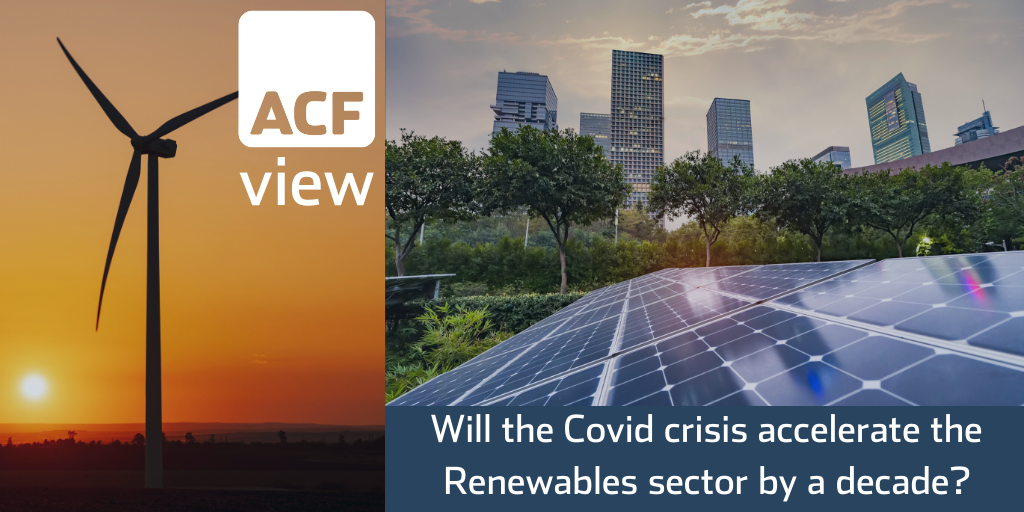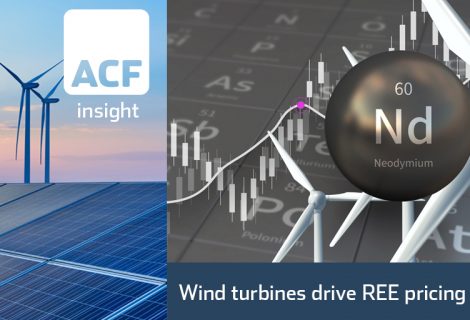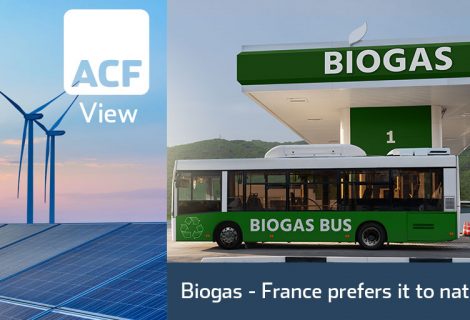Renewables – Can the Covid crisis accelerate the sector by a decade?
According to the stats provided by the UK electricity grid, renewable energy sources wind and solar accounted for 30% of grid power over the last month vs. 23% this time last year and there has been no electricity on the UK grid sourced from coal power stations for the last 37 days and counting.
There has also been a 14% drop in electricity demand over the last month and prices for electricity are down 40%. So how is it that renewables solar and wind have done so well during the Covid months of April and May in the UK and what, if anything, does this say for the future rate of growth/adoption for wind and solar?
There are several factors that have helped renewables, which can be boiled down into climate, physics, policy and Covid; though not every renewable is a winner.
Solar and wind energy have benefitted from the effects of bright days and low pollution during April and May compared to this time last year. Bio energy has been disadvantaged by supply chain problems with respect to fuel supply, thanks to Covid.
The sun is the source of ‘fuel’ for solar and wind energy. Photons drive solar and the sun’s heating effects drive wind energy, as such Covid related supply problems have no effect on ‘fuel’ supply for wind and solar.
In addition, renewables get preferential policy treatment – they have preferential access to the grid in terms of supplying customers and prices get government support in various ways, not least of which is through the predictability of purchase power agreements, which provide long term revenue guarantees at least on a price per watt supplied basis.
Low pollution and sunny windy days have allowed solar and wind to be more efficient producers financially and practically. Solar and wind energy are lower polluters, excluding the unintentionally large-scale release of SF6 (Sulphur Hexafluoride), there is an inescapable circularity here.
The factors above give solar and wind a certain differentiating strategic cache. But this may not be enough in of itself to galvanise political thought (though it should be) to prioritise and accelerate investment in wind and solar energy.
Covid, primarily a respiratory disease, has created a crisis that has delivered clean air to the world’s cities for the first time in 40 years. There is an irony in this that we believe is not lost on significant segments of the world’s population.
The general consensus is that, long-term, clean air in cities will be down to the infrastructure rollout and mass adoption of EVs (electric vehicles) and these require nickel, a metal in short, and soon to be shorter, supply (see the development of nickel prices, available mineable resource and competing uses).
In addition, there is the argument that if you generate the electricity to charge EVs from fossil and other polluting fuels, there are no gains, it may conceivably be even worse due to efficiency and transmission losses.
Our view is perhaps more nuanced – we accept the potential EV constriction and energy supply arguments above, but we also assess that Covid will change working patterns for good.
Travel patterns will stay changed by Covid, at least in the developed world. People will work from home far more than they ever did, technology assists this – and this is not to say the office is dead (see our blog), people will still go to the office, just significantly less often.
White collar workers who are, as a majority, able to work from home are also the largest users of cars and aeroplanes (higher pollution emitters) in many parts of the world, whereas those that have to travel to their work are greater users of public transport (which is generally accepted to emit less CO2 per passenger mile), where that is available.
The car has many attractions not just its ability to get from A to B in relative comfort, there are softer issues about freedom of choice, flexibility and empowerment; all key qualitative factors in the scales of human happiness.
But in the end in cities, we assess that, car ownership will reduce (car sharing may increase) and those that keep cars, will carry out fewer short journeys (the most pollution emitting, least efficient, type of journey).
Our expectation is that clean air and the environment will receive a significant and almost immediate political push as a result of Covid and that the beneficiary will be renewable energy, specifically or primarily the wind and solar sub-sectors. A popular or populist drive for change usually matters to democratic politicians and dictators alike, at least if they want to keep their jobs.
The drivers for very significant change in favour of wind and solar renewable energy are coalescing thanks in large part to the Covid crisis – popular demand for clean air, a change in working patterns leading to a change in journey patterns, the discovery of a bit more nickel or a clean substitute, will lead to the acceleration of the electricity contribution of wind and solar, by at least a decade, and perhaps a lot more.
















